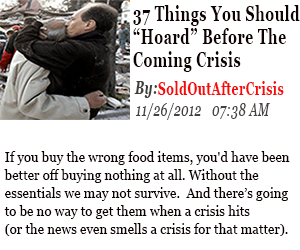Todd’s Note: I know that many of you who visit this site are seasoned preppers. This article is not for you. This article is meant as an introduction to getting someone to prepare with the basics of food, water and information. If you know of someone who is not a prepper, but could benefit from this information, please pass it along. We all know people that we care about who are not prepared, hopefully this article will show them the common sense behind it.
We do a lot to make sure that are families are safe and secure from all the craziness the world wants to throw at them! You talk to your family about safety and how to be careful in public. You purchase insurance just in case there is an emergency. You care about their education and if they will be successful. This list could go on and on. But what if there were a few more things that you could do, right now, that you haven’t thought of, to help make sure your family was better off in the near future. Would you do them? Do you want to know?
There is no doubt that everyone is “feeling” the economy. Going to the grocery store doesn’t buy what it used to. And, to make it worse, the weather in the US isn’t cooperating either. In the near future, we are going to see food prices go even higher. This isn’t doomsday fear mongering, this is fact!
A recent article and chart sited on CNBC mentioned to expect increases in grain, meat and even chocolate. Actually, increases, that is on top of what we are paying now, will be experienced across the board.
“Dinner is served, and with inevitable food cost inflation, consumers will want to pay more attention to grocery store prices this year.
According to a U.S. Department of Agriculture Consumer Price Index report, food prices are expected to increase by 1.25 percent to 1.75 percent, and food-at-home prices are predicted to increase by .75 percent to 1.25 percent. Meat, poultry, fish, fruits and vegetables will all see similar rises.”
Source: CNBC
To exacerbate the problem, Mother Nature is making sure we pay attention! The drought in California is going to affect prices too! Most Americans don’t realize all the food products that come from California. Rest assured that you will pay more for many fruits and vegetables and other food items.
Recently, Michael Snyder wrote:
“The state produces 99 percent of the artichokes grown in the US, 44 percent of asparagus, a fifth of cabbage, two-thirds of carrots, half of bell peppers, 89 percent of cauliflower, 94 percent of broccoli, and 95 percent of celery. Leafy greens? California’s got the market cornered: 90 percent of the leaf lettuce we consume, along with and 83 percent of Romaine lettuce and 83 percent of fresh spinach, come from the big state on the left side of the map. Cali also cranks a third of total fresh tomatoes consumed in the U.S.—and 95 percent of ones destined for cans and other processing purposes.
As for fruit, I get that 86 percent of lemons and a quarter of oranges come from there; its sunny climate makes it perfect for citrus, and lemons store relatively well. Ninety percent of avocados? Fine. But 84 percent of peaches, 88 percent of fresh strawberries, and 97 percent of fresh plums?”
Source: End of the American Dream
And for those of us Red Blooded Americans, more bad news:
“According to the Washington Post, the U.S. cattle herd has gotten smaller for six years in a row, and the amount of beef produced is expected to drop to a 20 year low in 2014…”
Source: The Organic Prepper
If you need more convincing, you can read a recent article (Jan. 20, 2014) on Breitbart, but the headline tells you everything you need to know – California Drought: Higher Food Prices, Fewer Jobs, Less Power.
My point in providing you all that data is that you can do some very basic, common-sense things that will help your family’s budget and give youPeace of Mind as your pay check has to work harder and harder for you.
Below you will find a common-sense action plan and links for more information on what you can do.
1. Buy Extra Food Now – Any food you buy now will cost less than when you buy it in the future. Think about it as an investment. Utilizing a “First In-First Out” method (rotation), you can make sure that your food doesn’t ever expire. But if you think you should toss something, make sure that it is “REALLY” expired!
Don’t forget to use coupons, buy sales and plan your meals out. All these things will help your budget. For a great article on knowing when certain foods goes on sale – click here and here.
2. Store Some Water for Cooking & Hygiene – I bet the people in West Virginia, experiencing the issues with the leaked 4-Methylcyclohexane Methanol in their water supply had extra water! Storing water is so easy and rarely requires spending money! Yes, you can purchase a new 55 gallon drum if you want. But, water storage is as simple as cleaning out used 2 liter bottles of soda or bottles of fruit juice (not milk jugs), filling them up with water and then putting them away somewhere out of sight! You can put a little bit of chlorine in each bottle and rotate it every 6 months if you want to. These plastic bottles are food grade and will last!
3. Stay Informed – It’s easy to veg in front of the TV every night and watch the junk the networks provide for you, it’s mindless and numbing. Staying informed requires a little bit more effort. But, you will then know what is going on in the world and not get side-swiped when the economy, food prices, water problems or anything else goes south. Find some news sources that you feel you can trust. It’s amazing how many people don’t realize what is going on outside their little world!
A little preparedness now, pays big dividends later!
If you are ready to learn a lot more about protecting yourself and your family.
SOURCE : edthatmatters.com



